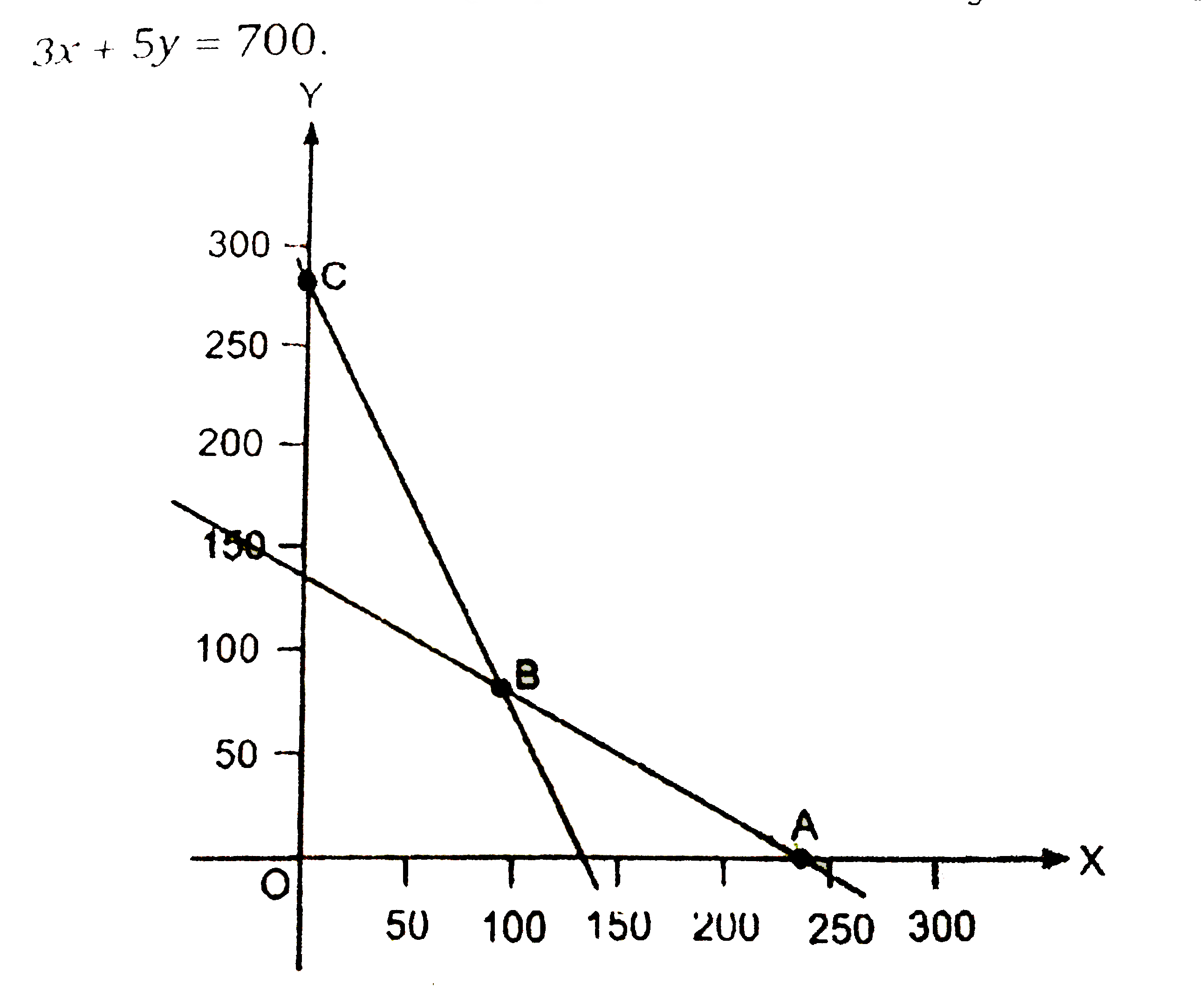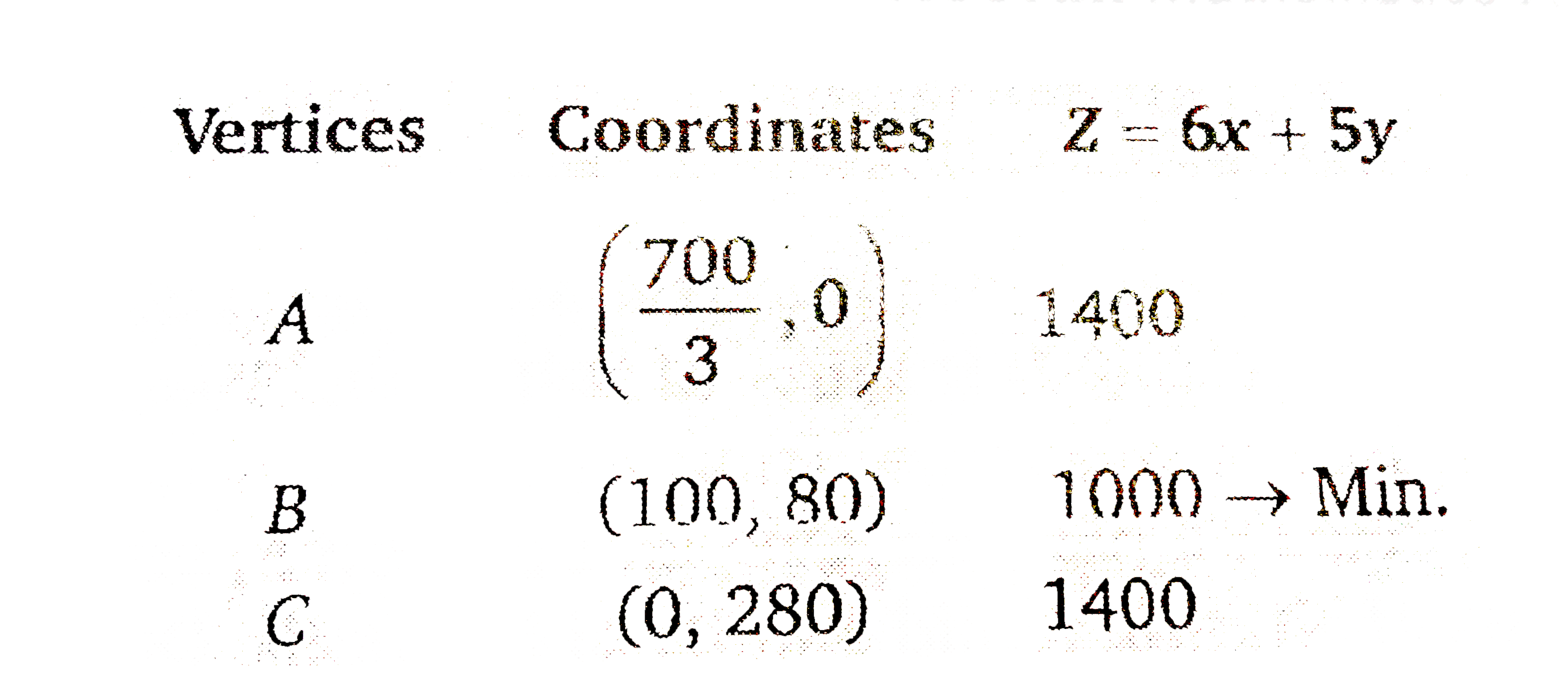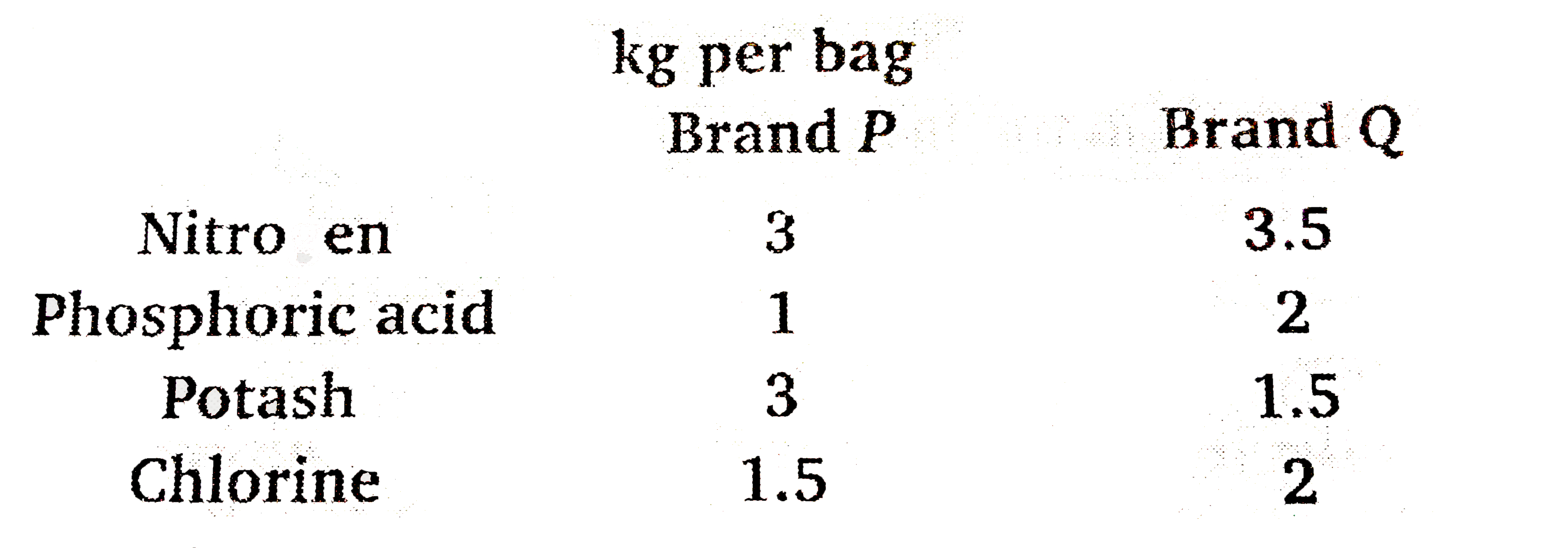There are two types of fertilisers F1 and F2.F1 consists of 10% nitrogen and 6% phosphoric acid and F2 consists of 5% nitrogen and 10% phosphoric acid. After testing he soil conditions a farmer finds that she needs at least 14 kg of nitrogen and 14 kg of phosphoric acid for her crop. If F1 costs Rs. 6/kg and F2 costs Rs. 5/kg, determine how much of each type of fertiliser should be used to that nutrient requirements are met at a minimum cost. What is the minimum cost?
Let x kg and y kg of F1 and F2 respectively are used.

According to the problem,
Minimum cost Z=6x+5y
and constraints x≥0,y≥0
10x100+5y100≥14⇒2x+y≥280
6x100+10y100≥14⇒3x+5y≥700
First draw the graph of the lines 2x+y=280 and 3x+5y=700.

Now, we find the feasible region using constraints 2x+y≥280,3x+5y≥700,x≥0,y≥0 and shade it.
It vertices are A(250,0),B(100,80) and C(0,280). We find the value of Z at these vertices.

Therefore, the minimum cost is Rs. 100 using 100 kg F1 and 80kgF2 fertiliser.
Topper's Solved these Questions
- LINEAR PROGRAMMINGBOOK - NAGEEN PRAKASHANCHAPTER - LINEAR PROGRAMMINGEXERCISE - Miscellaneous Exercise
9 Videos
- LINEAR PROGRAMMINGBOOK - NAGEEN PRAKASHANCHAPTER - LINEAR PROGRAMMINGEXERCISE - Exercise 12.1
10 Videos
- INVERES TRIGONOMETRIC FUNCTIONSBOOK - NAGEEN PRAKASHANCHAPTER - INVERES TRIGONOMETRIC FUNCTIONSEXERCISE - Miscellaneous Exercise (prove That )
9 Videos
- MATRICESBOOK - NAGEEN PRAKASHANCHAPTER - MATRICESEXERCISE - Miscellaneous Exerice
15 Videos
Similar Questions
There are two types of fertilisers F1and F2. F1, consists of 10% nitrogen and 6% phosphoric acid and F2consists of 5% nitrogen and 10% phosphoric acid. After testing the soil conditions, a fanner finds that she needs atleast 14 kg of nitrogen and 14 kg of phosphoric acid for her crop. If F1 cost Rs.6/kg and F2 costs Rs.5/kg, determine how much of each type of fertilizer should be used so that nutrient requirements are met at a minimum cost. What is the minimum cost?
View SolutionThere are two types of fertilisers ‘A’ and ‘B’. ‘A’ consists of 12% nitrogen and 5% phosphoric acid whereas ‘B’ consists of 4% nitrogen and 5% phosphoric acid. After testing the soil conditions, farmer finds that he needs at least 12 kg of nitrogen and 12 kg of phosphoric acid for his crops. If ‘A’ costs Rs. 10 per kg and ‘B’ cost Rs. 8 per kg, then graphically determine how much of each type of fertiliser should be used so that nutrient requirement are met at a minimum cost.
View SolutionA gardener has a supply of fertilizer of type I which consists of 10% nitrogen and 6% phosphoric acid and type II fertilizer which consists of 5% nitrogen and 10% phosphoric acid. After testing the soil conditions, he finds that he needs at least 14 kg of nitrogen and 14 kg of phosphoric acid for his crop. If the type I fertilizer costs 60 paise per kg and type II fertilizer costs 40 paise per kg, determine how many kilograms of each fertilizer should be used, so that nutrient requirements are met at a minimum cost. What is the minimum cost?
View SolutionA gardener has supply of fertilizer A which consists of 10% nitrogen and 6% phosphoric acid and fertilizer B which consists of 5% nitrogen and 10% phosphoric acid. After testing the soil conditions, he finds that he needs at least 14 kg of nitrogen and 14 kg of phosphoric acid for his crop. If fertilizer A costs 10.60 per kg and fertilizer B costs 8.40 per kg, what is the minimum 'cost at which the farmer can meet the nutrient requirement by using a combination of both types of fertilizers? Rs.1488 b. Rs.1576 c. Rs.1648 d. Rs 1732
View SolutionA farmer has a supply of chemical fertilizer of type A, which contains 10% nitrogen and 5% phospheric acid and type B, which contains 6% nitrogen and 10% phospheric acid.After testing the soil conditions of the field, it was found that at least 14 kg of nitrogen and 14 kg of phospheric acod are required for producing a good crop.The fertilizer of type A costs ₹ 5 per kg and type B costs ₹ 3 per kg.How many kg of each type of the fertilizer should be used to meet the requirement at minimum cost? Using LPP, solve the above problem graphically.
View Solution(Allocation Problem)A farmer has a supply of chemical fertilizer and type I which contains 10% nitrogen and 6% phospheric acid and type II fertilizer which contains 5% nitrogen and 10% phospheric acid. After testing the soil condition of a field, it is found that at least 14 kg of nitrogen and 14kg of phospheric acid are required for a good crop.The fertilizer type I costs ₹.2.00 per kg and the type II ₹ 3.00 per kg.How many kilograms of each fertilizer should be used to meet the requirements and the cost be minimum?
View SolutionA fruit grower canuse two types of fertilizer in his garden brand P and brand Q. The amounts (in kg) of nitrogen phosphoric acid, potash, and chlorine a bag of each brand are given in the stable. Tests indicate that the garden needs at least 240kg of phosphoric acid, at least 270 kg of potash and at most 310 kg of chlorine.
If the grower wants to minimise the amount of nitrogen added to the garden, how many bags of each brand should be used? What is the minimum amount of nitrogen added in the garden?

View SolutionA fruit grower can use two types of fertilizer in his garden, brand P and brand Q. The amounts (in kg) of nitrogen, phosphoric acid, potash, and chlorine m a bag of each brand are given m the table. Tests indicate that the garden needs at least 240 kg of phosphoric acid, at least 270 kg of potash and at most 310 kg of chlorine. If the grower wants to minimise the amount of nitrogen added to the garden, how many bags of each brand should be used? What is the minimum amount of nitrogen added in the garden?
View SolutionIf 6 kg of rice costs Rs 93, find the cost of 14 kg of rice.
View SolutionFill in the blanks:
Nucleotide = Nitrogenous base + _____________ + Phosphoric acid
View Solution
